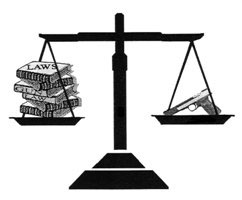 A federal district court judge’s recent ruling that upheld California’s scheme to stick law-abiding gunowners with the bill for the state’s law enforcement activities will be appealed by the National Rifle Association, California Rifle and Pistol Association and plaintiff firearms dealer Herb Bauer.
A federal district court judge’s recent ruling that upheld California’s scheme to stick law-abiding gunowners with the bill for the state’s law enforcement activities will be appealed by the National Rifle Association, California Rifle and Pistol Association and plaintiff firearms dealer Herb Bauer.
The lawsuit, Bauer v. Harris, was filed to prevent the California Department of Justice (DOJ) from using the money it received from charging firearm purchasers the mandatory and excessive Dealer’s Record of Sale (DROS) fee to fund its Armed Prohibited Persons System (APPS).
APPS is a DOJ firearm seizure program that uses cross-referenced law enforcement databases to track persons who have registered ownership of a firearm since January 1, 1991, and subsequently became prohibited from legally possessing firearms. A person on the APPS list becomes the target of further investigation for criminal firearm possession, and potentially an enforcement action by the DOJ to confiscate any firearm the person owns or possesses. The DOJ employs a significant number of APPS agents and employees, spending millions of DROS fee dollars annually.
The DROS fee was originally intended to fund the cost the DOJ incurs in conducting background checks on prospective firearm purchasers. Statutorily, the DOJ is required to limit the DROS fee to an amount no more than necessary to recoup the costs incurred from regulating the transfer of firearms. But over the years, despite the fact that technological advances have decreased the DOJ’s cost of doing background checks on firearm purchasers, the DROS fee imposed on firearms purchasers has risen dramatically, to the point where the DOJ had amassed a surplus of over $35 million.
Instead of lowering the DROS fee or giving firearm purchasers their money back, the Legislature passed Senate Bill 819 in 2011, authorizing the DOJ to use the surplus DROS fee revenue to regulate the “possession” of firearms—an extreme expansion of the DOJ’s original statutory authority on how to use DROS fee monies. Under S- 819 the DOJ now uses the surplus DROS fees revenues to fund APPS.
With this lawsuit The CRPA Foundation and the other plaintiffs do not dispute the legality of the APPS program itself or even the DROS fee. Nor do they question whether these are good policies. Rather they argue only that the DOJ’s use of DROS fee revenues to fund general law enforcement activities like APPS that are completely unrelated to the valid regulation of lawful firearm purchases places an unconstitutional precondition on the exercise of the fundamental Second Amendment right to buy a firearm.
The court upheld the DOJ’s scheme because it found that the DROS fee “falls outside the historical scope of the Second Amendment.” Specifically, the court interpreted language from the Supreme Court indicating that “laws imposing conditions and qualifications on the commercial sale of arms” are “presumptively lawful” to mean that anything relating to the sale of firearms automatically falls outside the Second Amendment’s reach. Plainly, this was not what the Supreme Court had in mind when it penned its landmark Second Amendment rulings in 2008 and 2010. The district court’s misguided view of Supreme Court precedent would grant the government license to place virtually any restriction it wants on firearm transfers with impunity, allowing state and local governments to effectively destroy the right to keep and bear arms at its source.
Equally troubling was the court’s suggestion that even if the DROS Fee involved constitutionally protected conduct, “it places only a marginal burden on “the core of the Second Amendment,’ “ so it would be upheld regardless. Of course, the courts would never sanction a “marginal burden” of this nature on any other right.
Attorneys for the NRA, CRPA Foundation, Herb Bauer’s Sporting Goods, and individual firearm owners plan to appeal the decision and take every step necessary to enjoin the State’s unconstitutional use of DROS funds. If Plaintiffs prevail, DOJ’s use of DROS funds to sponsor APPS would be deemed unconstitutional and the DROS fee will likely be lowered. Briefing will commence in the Ninth Circuit Court of Appeals. Please stay tuned for further updates on this case as it proceeds on appeal.



